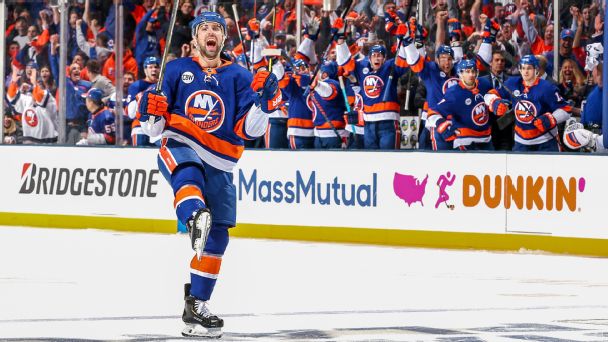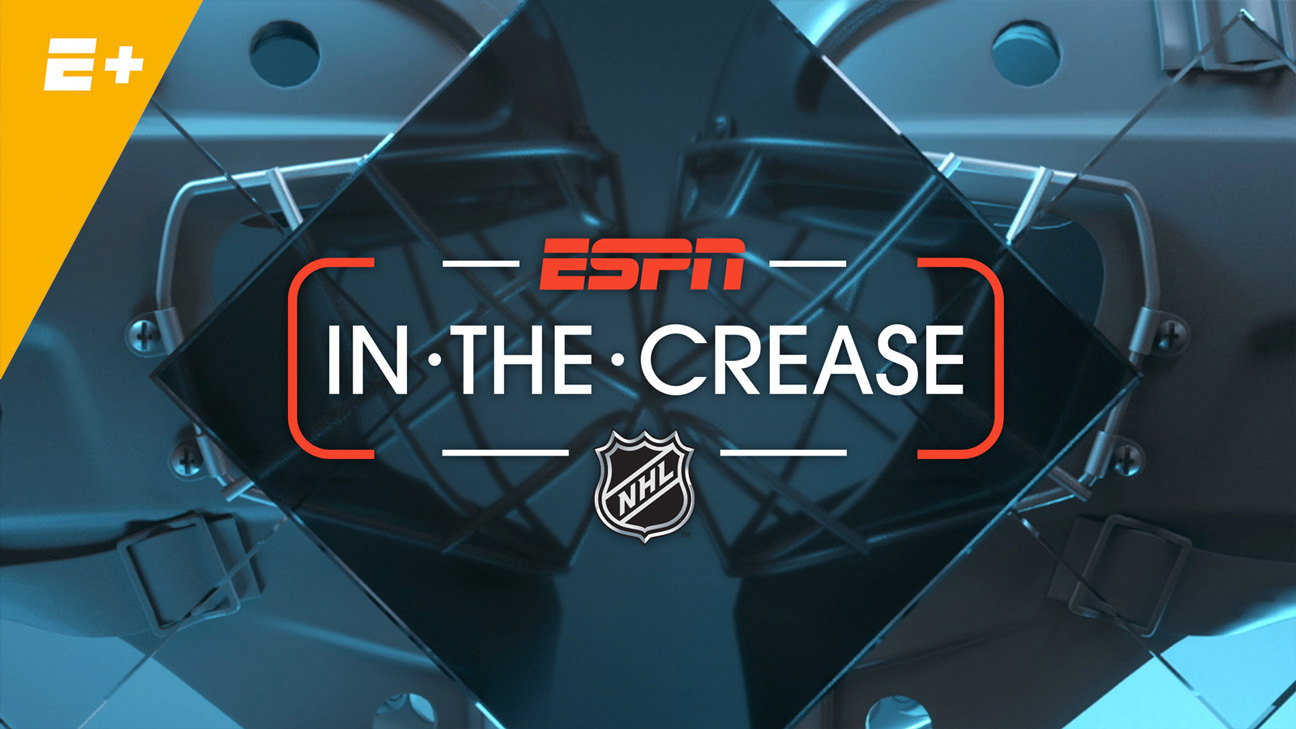It’s an annual rite that seemed to skip a year: Where was the usual outrage over the NHL Awards nominations? The nominations seemed to arrive and then leave the public consciousness faster than that “Hellboy” remake with Chief Hopper from “Stranger Things.”
Part of me hopes that it’s because the Professional Hockey Writers Association got it (mostly) right this season. Most of me believes the award nods were just overwhelmed by the shock and awe of the most unpredictable postseason in nearly 15 years. It’s hard to get riled up over the Selke Trophy nominations when the Columbus Blue Jackets are winning their first playoff series in franchise history over one of the most successful regular-season teams in hockey history, you know?
So, as a public service, here’s a breakdown of the major awards and some analysis. I did not include the Masterton Trophy, which will go to Robin Lehner; the Lady Byng, which the referees and linesmen should vote on instead of the writers; and the Mark Messier Leadership Award, a vanity project that should have disappeared when its sponsorship did.
Also in this week’s Wysh List: Fix these rules | Jersey Foul
A tribute to Jason Botchford | Puck Headlines
Hart Trophy (most valuable player)
Nominees: Sidney Crosby, Pittsburgh Penguins; Nikita Kucherov, Tampa Bay Lightning; Connor McDavid, Edmonton Oilers
Surprisingly absent: Johnny Gaudreau, Calgary Flames
Frustratingly absent: Brad Marchand, Boston Bruins
Likely winner: Kucherov
It’s easy to understand how Connor McDavid became just the sixth player in the last 51 years to become a Hart finalist despite his team not qualifying for the postseason.
Last season, he finished fifth for the award in a season where support from the voters had crystallized around four players: Taylor Hall, Nathan MacKinnon, Anze Kopitar and Claude Giroux. This season, Kucherov was a lock as a finalist. Crosby had strong support. But beyond them, it was wide open. So McDavid found enough votes through his 116-point season, the Oilers’ putrid numbers without him on the ice and what we assume is a significant amount of pity for being stuck in the bottomless abyss of that organization.
2 Related
The irony is that even through the Oilers finished closer to a playoff spot this season — a still-embarrassing 11-point margin — McDavid’s performance was arguably more impressive last season, finishing 38 points ahead of Edmonton’s second-leading scorer Leon Draisaitl. The margin was just 11 points this season. Typically, that gap is a leading indicator of Hart candidates. Unless, of course, you’re Marchand, who finished 19 points ahead of David Pastrnak but took a back seat to McDavid here.
Of course, you know I feel all of this is moot: McDavid shouldn’t win the Hart and shouldn’t be a finalist because his team finished 11 points out of a playoff sport. I went into this in greater detail last season, but the abridged version is: The Hart’s description mentions “value to his team.” The Hart isn’t entirely beholden to wins and losses, but it’s not without consideration of the candidate’s team and what value his performance holds within the context of that team. Hence, there’s little value in a performance that results in a team finishing that far out of the playoffs; in fact, one could argue McDavid’s performance was actually deleterious to the Oilers’ actual need, which was to increase their draft lottery chances as best as possible.
Without Crosby, the Penguins don’t make the playoffs. Without Kucherov, the Lightning don’t challenge history. Without Brad Marchand or Ryan O’Reilly, who were also on my ballot, the Bruins and Blues don’t place where they placed in playoff seeds. Without McDavid, the Oilers are … still nowhere near the playoffs. There’s a reason only six non-playoff players have been nominated for the Hart, and there’s a reason only one of them captured it: Mario Lemieux in 1986, whose team finished two points out of a playoff spot. Or, nine closer than McDavid’s team did this season.
Norris Trophy (top defenseman)
Nominees: Brent Burns, San Jose Sharks; Mark Giordano, Calgary Flames; Victor Hedman, Tampa Bay Lightning
Surprisingly absent: Morgan Rielly, Toronto Maple Leafs
Frustratingly absent: John Carlson, Washington Capitals
Likely winner: Giordano
Obviously, Drew Doughty’s negative campaigning against Burns didn’t keep him from a nomination, thanks to his 83-point season. But the biggest stunner here was Hedman, although perhaps not as stunning when you consider how reputation-based this award has been through the years. Hedman won it last season. His campaign this season simply missed those heights.
Rielly, Carlson and Kris Letang all deserved the nod over Hedman this season, but here we are. Can’t wait to see those PHWA ballots. And we better never hear another “if he played in Toronto, he’d be nominated” laments, because Rielly plays in Toronto and … welp.
Vezina Trophy (top goaltender)
Nominees: Ben Bishop, Dallas Stars; Robin Lehner, New York Islanders; Andrei Vasilevskiy, Tampa Bay Lightning
Surprisingly absent: Carey Price, Montreal Canadiens
Frustratingly absent: John Gibson, Anaheim Ducks
Likely winner: Bishop
The glaring absence here is Gibson, whose 18.66 goals saved above average was best in the NHL and whose underlying numbers were stellar. The general managers vote on this award, and we can only assume that they stopped paying attention to Gibson once the Ducks imploded.
Calder Trophy (rookie of the year)
Nominees: Jordan Binnington, St. Louis Blues; Rasmus Dahlin, Buffalo Sabres; Elias Pettersson, Vancouver Canucks
Surprisingly absent: Miro Heiskanen, Dallas Stars
Frustratingly absent: Heiskanen
Likely winner: Pettersson

Miss a game from the 2019 Stanley Cup playoffs? Want to experience a game again? Every playoff matchup is available for replay on ESPN+.
Can Binnington win this? Unfortunately, yes. Look, he had an outstanding rookie season with a 24-5-1 record, a .927 save percentage and a 1.89 goals-against average, pulling the Blues out of the basement with his superlative performance in 30 starts. Operative phrase being “in 30 starts.” There’s absolutely no way that Pettersson’s 66 points in 71 games should rank behind Binnington’s slice of a season. I had them first and second on my ballot.
I had Heiskanen third ahead of Dalhin on my ballot for two reasons: The role he played for the Stars, which was vital from October through April and included penalty-killing time; and his usage, getting just 52.8 percent of his starts in the offensive zone and playing against tougher competition. This is by no means an attempt to disparage the season that Dahlin had, as it was stellar. I just think Heiskanen was a smidge better.
Selke Trophy (best defensive forward)
Nominees: Patrice Bergeron, Boston Bruins; Ryan O’Reilly, St. Louis Blues; Mark Stone, Ottawa Senators/Vegas Golden Knights
Surprisingly absent: Aleksander Barkov, Florida Panthers
Frustratingly absent: Sidney Crosby, Pittsburgh Penguins
Likely winner: Stone
Once again, Bergeron gets a nomination despite not having the work history. He was third in the voting last season with 64 games played. He played 65 this season. Was he dominant? Sure, and this was another season up to Bergeron’s lofty standards. And while there have been players that won the Selke playing fewer than a full season, like Kris Draper in 2004 when he played 67 with the Detroit Red Wings, there should always be deference to the players that had outstanding campaigns while playing more games. O’Reilly played 82. Stone played 77. Sean Couturier played 80. Crosby played 79. And so on.
Anyway, the only thing I really care about here is Stone winning the Selke, for all the wingers that have been unceremoniously ignored through the years.
Jack Adams Award (best coach)
Nominees: Craig Berube, St. Louis Blues; Jon Cooper, Tampa Bay Lightning; Barry Trotz, New York Islanders
Surprisingly absent: Bill Peters, Calgary Flames
Frustratingly absent: Bruce Cassidy, Boston Bruins
Likely winner: Trotz
The NHL’s broadcasters vote on this one. The award comes down to Trotz winning the Stanley Cup, leaving over a financial dispute, taking over a broken team and turning them into a defensive juggernaut; vs. Cooper, who coached a 128-point team with 62 wins and a plus-103 goal differential.
One assumes the Trotz narrative will be too enticing to the voters … although we’d love to see Cooper win, just for the speech that celebrates one of the greatest regular seasons in NHL history that then lasted four ignominious games in the postseason.
Jersey Foul of the Week
From the Shark Tank:
@wyshynski got a pretty good #jerseyfoul for ya pic.twitter.com/Hd9KSdDNwB
– Jacob Mendelson (@sjsharksfinatic) April 27, 2019
The NHL-as-NFL jersey bit usually works in the opposite direction, such as in Washington D.C. with “Ovechkin” Redskins jerseys. Obviously there’s a bit more going on here than a Sharks fan supporting the Niners, but again: Hockey sweaters are for hockey things. But please drop some money on a Tomas Hertl 49ers jersey at your leisure.
Three obvious rule changes after two rounds of the playoffs
1. Video review on majors involving the stick. I know there’s a raging debate about expansion of replay for penalties, but this one is simple: Instead of having four guys on the ice guess about what happened and invent something that didn’t — like the officials in Game 7 of the Sharks vs. Golden Knights series did on the cross-check to Joe Pavelski’s chest that earned Cody Eakin a five-minute major — just use a quick review to double-check that this was the right call. Where did the stick land? Whose stick was it? And so on.

Postgame analysis and highlight show airing each night throughout the season from Barry Melrose and Linda Cohn.
It’s such a simple, logical application of replay that doesn’t have to lead to any further expansion. Which is why, of course, the NHL won’t apply it, despite Vegas owner Bill Foley’s vow to introduce it at the next Board of Governors meeting.
2. This dumb puck-into-the-netting rule. The NHL rulebook is truly an onion, as we peel away the layers of each rule and find new levels of stink. The situation in Game 4 between the Blue Jackets and Bruins was putrid. Please recall the puck hitting the spectator netting, falling to the ice, Oliver Bjorkstrand playing the puck and Artemi Panarin eventually putting it into the net behind Tuukka Rask. According to the rules, the play wasn’t reviewable because it’s only reviewable when (a) the puck goes straight into the goal off the netting or (b) when the first player who touches the puck off the netting scores.
As Kerry Fraser put it:
A missed offside at blue line resulting in “eventual” goal so long as puck doesn’t exit the zone can be reviewed & overturned. A missed puck out of play resulting in goal must go directly into the net on immediate ensuing play (no 1 pass)….just inconsistency or bad rule #both – Kerry Fraser (@kfraserthecall) May 3, 2019
Indeed.
3. Just get rid of “intent to blow” already. One of the worst rules on the books is the “intent to blow” rule in which a referee can end a play in his mind before actually blowing the whistle. The thinking is that it takes time for the brain to send a signal to the lungs to create the thrust of air that is sent through the whistle that ends the play, and thus an official can think a play is over before we hear that it is.
This goal on April 25 between Dallas and St. Louis should not have counted if “intent to blow” is a thing. C’mon. Chris Rooney blows his whistle like a millisecond after the puck goes in. He can’t see the puck beforehand. The ruling was “that the puck completely crossed the St. Louis goal line before he blew his whistle to stop play.” OK, great: Then why is that not the standard in every situation, rather than the occasional “the play ended before you heard the whistle … in my mind.” This rule is the worst, and this goal shows why.
Listen to ESPN On Ice
Emily Kaplan and I kept it in the ESPN family this week for a fun chat with Bomani Jones about why Carolina Hurricanes fans dislike him and about the Toronto media. Plus Mike Rupp of NHL Network discusses the Boston Bruins vs. Columbus Blue Jackets series and the next step for the Pittsburgh Penguins. Stream here and grab it on iTunes here.
Remembering Botch
Jason Botchford died at age 48 this week from heart failure. He was one of the most innovative hockey writers in the business, as one of the first newspaper beat guys to figure out how to meld that style with the blog aesthetic, with the “Provies” for The Province, and then the “Athleties” after he made the jump to The Athletic. He was brash and combative and loved the art of debate, which is why his dust-ups were so compelling.
I had two interactions with him that I’ll remember, one regrettable and one memorable.
The regrettable one was the time I tried to be Internet Cop and proclaim that his game recaps were an idea borrowed from the Pensblog, which was a Pittsburgh Penguins fan site that did hilarious reviews of games using inside jokes and random images. This was said in a moment of Twitter Rage (as most regrettable things are). No one that’s creative wants to be accused of having their work be derivative, and things got heated, because I was being petty and stupid. But some time later, we had a chat and I acknowledged what I should have in the first place: That he had reinvented the wheel. That what he was doing with game recaps hadn’t been done before, and was going to influence how it could be done by others. The number of young writers who acknowledged his influence on their own coverage of teams was a testament to that.
The memorable one was perhaps the most infamous Botch moment. You’ve no doubt heard about the Joe Thornton four goals “rooster” trick. It’s one of the most famous memes in the NHL. Well, Botch was the one who reported that quote from the Sharks locker room, and started a media firestorm about the ethics of, basically, reporting on locker room banter. It was a fascinating moment in hockey journalism back in 2013, and few things spoke better to Botch’s bravery as a writer than the way he defended himself. (We had him on “Marek vs. Wyshynski” at one point to talk about it, but that podcast episode is lost in history, alas.)
If nothing else, the Thornton moment captured the essence of Jason Botchford, which was: Having an unwavering loyalty to his audience to report with candor and honesty. It’s why a community of Vancouver Canucks fans grew around his work and supported it rabidly, and it’s why that same community was so rocked by his tragic loss this week.
R.I.P. to Jason Botchford, to whom I pay the greatest compliment I can as a writer: You were never ordinary, sir.
This tribute from Mike Halford and Jason Brough on The Athletic ($) is worth your time, as is this column from Ed Willes. A Go Fund Me page to support his family has over $50,000 in donations at last count.
Puck headlines
Gary Bettman’s testimony in front of the House of Commons on concussions was as divisive as expected. I don’t disagree with him on the idea that banning all contact with the head on checks would fundamentally change the NHL. Nor do I think it’s fair to leave the wishes of the players in the background, when the NHLPA’s polling has constantly shown support for fighting and hitting. But his continued CTE denial is an embarrassment for the NHL and its fans, and a tarnish on his legacy every bit as repugnant as a cancelled season.
Hockey in Pop Culture Part 1: The Onion takes a run at the “hockey is better in person” thing.
Hockey in Pop Culture Part 2: “The Simpsons” jump on the Ottawa Senators dog pile.
Unhappiness with the coverage of the Blues vs. Stars series in St. Louis.
The Columbia Journalism Review takes the hockey media to task for its coverage of the Alex Ovechkin fight.
Getting your beer in the Hockey Hall of Fame seems to be a noble calling.
Boston students stage a walkout to protest their hockey coach not getting his contract renewed.
Why “Moneyball” can’t work in the NHL.
Hockey tl;dr (too long; didn’t read)
“Inside Team USA’s heartbreak and redemption,” as Craig Custance goes inside Team USA ($).
In case you missed this from your friends at ESPN
Great reporting here from Emily on the women’s hockey boycott that could kill off the NHWL.
Credit: Source link
